A Quote by Anand Giridharadas
Right after college, after growing up in the United States, I moved to India, broadly telling the story of how an old and stagnant country was suddenly waking up. And I came home, back to America, in 2009 after telling that story and writing a book about that.
Related Quotes
Every story is flawed, every story is subject to change. Even after it is set down to print, between covers of a book, a story is not immune to alteration. People can go on telling it in their own way, remembering it the way they want. And in each telling the ending may change, or even the beginning. Inevitably, in some cases it will be worse, and in others it just might be better. A story, after all, does not only belong to the one who is telling it. It belongs, in equal measure, to the one who is listening.
I would like to believe this is a story I’m telling. I need to believe it. I must believe it. Those who can believe that such stories are only stories have a better chance. If it’s a story I’m telling, then I have control over the ending. Then there will be an ending, to the story, and real life will come after it. I can pick up where I left off.
I realized how little I knew about my own country. I had grown up in the suburbs and, after college, I moved out of the country, so I didn't really know the place well. When I started following soldiers and their families back home, it provoked a lot of the questions about who we are as a nation, questions I realized couldn't be explored through the more limited framework of looking at the military at war and at home.
Same old boring boring story America can’t stop telling itself. What is this sicko fascination? Every book and movie practically has to have a little, right? But why do you think all those runaways are on the streets tearing up their veins with junk and selling themselves so they can sleep in the gutter? What do you think the alternative was at home?
I always knew from the beginning that this was the only way to write Then We Came To The End - that it had to be in first - person plural if it was going to illustrate how the individual becomes part of the collective. I had no interest in writing the book in a more conventional voice. It goes back to that fascination I had with telling a story in multiple ways. It was the only choice I gave myself, really - I said "This is it, pal. If you can't tell a story this way, you're going to have to abandon the book. Write it this way or give up."
It wasn't long after I began writing Star Wars that I realized the story was more than a single film could hold. As the saga of the Skywalkers and Jedi Knights unfolded, I began to see it as a tale that could take at least nine films to tell - three trilogies - and I realized, in making my way through the back story and after story, that I was really setting out to make the middle story.
The reality that we were growing up in was very young and vibrant, and nobody was capturing that part of India. I started to backpack after getting out of college. I hiked and did a lot of things nobody was capturing in art at all in India, so I wrote my first novel. It was a very, trippy, experience-filled novel, and it ended up doing very well in India because nobody was writing about that at that point.
I had a cup of tea with Michael Howard after my appointment shortly after I became Home Secretary, and without telling tales out of school, shortly after I became Home Secretary, and he said that when people used to ask him whether he enjoyed it he'd reply that "enjoy" wasn't quite the right description.
And of the Witch? In the life of a Witch, there is no "after", in the "ever after" of a Witch there is no "happily"; in the story of a Witch, there is no afterword. Of that part that is beyond the life story, beyond the story of the life, there is-alas, or perhaps thank mercy-no telling. She was dead, dead, and gone, and all that was left of her was the carapace of her reputation for malice.
You're not allowed to park a truck in your driveway. You're not allowed to work on your house on Sunday. The people who enforce these laws are nuts. After I wrote a column on this, I got I don't know how many letters from Coral Gables homeowners, story after story after story, wonderfully horrible stories. And the venom they felt for their own government!
The baby explodes into an unknown world that is only knowable through some kind of a story – of course that is how we all live, it’s the narrative of our lives, but adoption drops you into the story after it has started. It’s like reading a book with the first few pages missing. It’s like arriving after curtain up. The feeling that something is missing never, ever leaves you – and it can’t, and it shouldn’t, because something is missing.



































